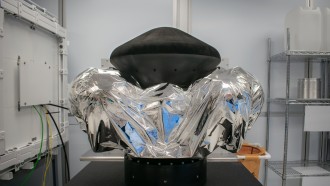Sending a human to the surface of Mars would be the next big space-age milestone, but getting there safely would be a problem.
A new study backed by NASA has found that long voyages into deep space might significantly damage the gastrointestinal tissue of a person, leading to long-term health complications. Exposure to long-term galactic cosmic radiation can kill astronauts heading to the red planet.
How Cosmic Radiation Can Kill Humans
Researchers from the Georgetown University Medical Center simulated what will happen to astronauts when exposed to galactic cosmic radiation by using the small intestines of mice as a model system and low-dose iron radiation.
"Heavy ions such as iron and silicon are damaging because of their greater mass compared to no-mass photons such as x-rays and gamma (g)-rays prevalent on Earth, as well as low mass protons in outer space," explained associate professor Kamal Datta, the study's senior investigator.
After exposure to low-dose iron radiation, the researchers found that the small intestines of mice no longer absorbed nutrients adequately. The animals also develop cancerous polyps, raising concerns about the high risk of stomach and colon cancer in voyaging astronauts.
In addition, the researchers also found an evidence that iron radiation also triggers the increase in the number of senescent cells. According to Professor Datta, this affected the migration of the cells needed to replace the lining of the small intestines, slowing down the function of the gastrointestinal tissue.
Albert Fornace Jr. of NASA Specialized Center of Research said that the effects of the low-dose iron radiation are permanent.
Are Humans Ready For The Harsh Conditions In Space?
NASA has recently laid out a roadmap to return humans to the moon and, eventually, send a manned mission to Mars. According to Craig Patten, a physicist at the University of California, San Diego, it would take nine months for a spacecraft to land on the surface of Mars.
That is an extremely long time for a person to be exposed to cosmic radiation. While Earth is regularly bombarded with it, humans are protected by the magnetosphere and, therefore, not evolved to take huge doses in deep space.
Datta added that there is currently no available technology that can protect astronauts from galactic cosmic radiation.
"While short trips, like the times astronauts traveled to the Moon, may not expose them to this level of damage, the real concern is lasting injury from a long trip, such as a Mars or other deep space missions which would be much longer," he said.
Their findings were published in the journal Proceedings of the National Academy of Sciences.









